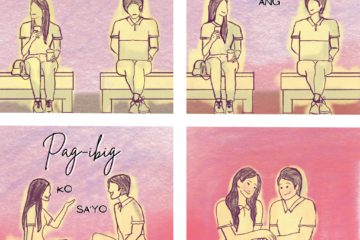
HUMANS HAVE the tendency to struggle for their survival. When circumstances born out of naturalism render them marred, they respond to the situation by defense. This defense manifests in the form of violence. There is always a propensity to fight—to emerge from the tumultuous arena that is the world victoriously. At times, this tendency takes on the extreme, when gruesome acts such as murder break the charts. Under psychoanalysis, the id, where all basic desires reside, is in this case insurmountable as all suppression exerted by the superego is exceeded.
Mikhail Red decides to picture this observation of Sigmund Freud. In Neomanila, the Audience Choice entry for the fifth QCinema International Film Festival, immorality in the city is represented by a spate of ruthless nighttime killings. There is a downpour of illusion that the violence terrorizing citizens may be solved through the same means. Vigilantes assume decision over the lives of others when, ironically, it is their own inescapable fates they are carving on the concrete sidewalks of the metropolis.
Pretension is shed in the beginning for the film catapults the viewers to a sneaky meth trade in a wet market. As soon as the exchange ends, Irma (Eula Valdez) points a gun at the buyer’s head and pulls the trigger. Unknowingly, the man she shot is the key for her nephew Toto (Timothy Castillo) to have his brother freed from the cold confines of the city jail. Yet he is severed of his worries as the police set his brother up by having the station bombed. Homeless and anguished, he joins his aunt and her confidant Raul (Rocky Salumbides) in stealthy drug operations before dawn.
The film is sequenced with episodes of corpses emptied of blood and peppering the streets with cardboards serving as temporary death tablets engraved with the words “Pusher ako.” Perhaps Red tells the viewers here that what is new in the city is the rise of extrajudicial killings. Yet there still remains and is in this case intensified, regression. Manila is drawn back to the instinctive roots where reason feels foreign and the only governing approach to each situation is aggression.
As each scene unfolds, a sense of dread hovers like a dark, heavy cloud ready to occasionally pour a storm of discomfort. It is accentuated with dimmed establishing shots of the skyline and hints of death such as gutted rats.
While each character is manipulated by the desire-driven id, one exhibits a decision to repress by the end of the film. As loyalty to the job and loyalty to the family converge in a single situation, Irma is torn on whom to kill. She seems to recognize the alienation of her life, and the only appealing reclamation is to choose the latter. So she takes her final shot, unmindful of the idea that a mistake may never be resolved by another mistake that seems as the easiest way out. In the final scene, she faces her demise.
It is in mirroring the grim picture of the present upon Neomanila anchors its strength. In Red’s microcosm plagued by midnight murders more morbid than what the stomach can digest, the white line toward redemption is effaced. Citizens are armed with the ardor for order but faulty judgments gear them toward an illusory peace. F



